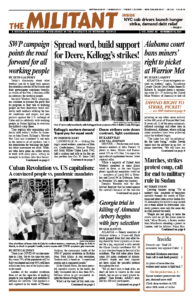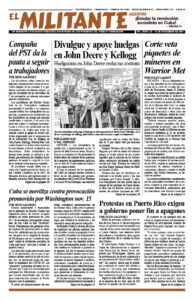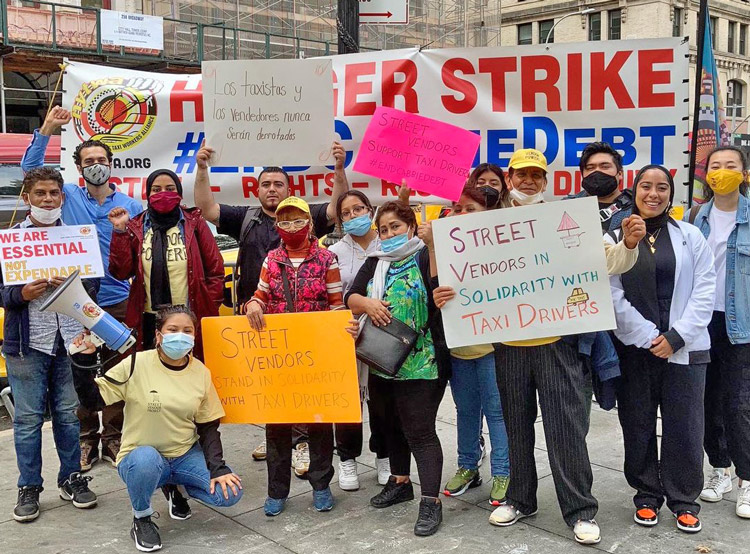NEW YORK — Yellow cab drivers organized by the New York Taxi Workers Alliance have been on a hunger strike here since Oct. 20. Their camp near City Hall takes up half the public sidewalk on Broadway, draped with banners, flags, and signs demanding, “Debt forgiveness now,” “Keep your promises” and “End cabbie debt: justice, rights, respect, dignity.”
A line of yellow cabs is parked along the curb. Those wearing red ribbons pinned to their jackets are the hunger strikers. Many are now sitting in chairs after about two weeks without food, and a van of medical volunteers checks on each one regularly.
Other cabbies regularly stop by to spend time with the hunger strikers between driving shifts.
This Militant worker-correspondent joined Willie Cotton, Socialist Workers Party candidate for New York City public advocate, as he visited the cab drivers’ hunger strike encampment Oct. 31. He delivered a case of bottled water. The camp runs 24 hours a day, seven days a week, and a constant stream of supporters and passersby stop for a chat, to drop off provisions, or honk as they drive by.
One of the organizers told Cotton that 22 new people had joined the fast that day, bringing the total number up to almost 40.
The drivers are demanding Mayor Bill de Blasio and the city take responsibility for the huge debts they’ve been saddled with. In years past drivers borrowed heavily to purchase medallions, city licenses that allow taxis to pick up passengers on the street. Yellow taxis had a monopoly in the Manhattan market, enforced by the New York City Taxi and Limousine Commission, until almost a decade ago. The price of medallions soared as they were promoted by the city as an investment that would help finance home mortgages, retirement plans, and college education for drivers’ children. The city raked in cash from auctioning additional medallions and from sales taxes.
But the medallion market has since collapsed. Competition from growing Uber and Lyft operations sent medallion values plummeting. Virtually all taxi business ground to a halt with lockdowns and bans on travel imposed by the government at all levels with the onset of COVID-19.
Erhan Tuncel, one of the hunger strikers, estimates he has paid $400,000 in interest on his medallion over 20 years. “We bought a dream from the city, our dream to be middle-class New Yorkers,” he told us. “We’ve lost that dream as there is way too much supply for the demand now.”
In 2018, eight drivers unable to cope with their debts committed suicide.
Víctor Salazar, originally from Ecuador, described what cab drivers face as “Ubernomics.” “They want to chop us into part-time ‘gig’ economy workers. But we are full-time drivers! We’re taking a stand for our lives, for our dignity,” he said. “Uber will starve their own drivers in order to starve us.”
Uber and Lyft drivers are among those who have come by the encampment to offer solidarity.
Salazar said the OSK firm that handled his loan came and physically removed the medallion from the hood of his cab, took his license plates, pried the meter from the dashboard and left him without credentials Aug. 24. “On that day they forced me to stop driving my cab” because he could no longer make his monthly “mortgage payments” on the medallion.
The city administration of liberal Democratic Party Mayor Bill de Blasio in March offered drivers up to $29,000 in grants to use to seek a better deal with creditors to pay off their outstanding medallion debts. But most owe far more than that. The city says only 155 drivers have taken up the offer and gotten creditors to restructure their loans.
Randal Wilhite, a lawyer with an agency working on the city’s program, recently came out against it, saying the lenders weren’t offering any substantial debt relief or have refused to participate in the effort at all.
The hunger strikers and the Taxi Workers Alliance are demanding lenders cap the debts at $145,000 and that the city guarantee to cover any driver who defaults on a loan.
“The working class has to stand together against Wall Street greed,” Salazar said. Cotton described the number of strike battles taking place across the country today, from Warrior Met coal miners to John Deere to ExxonMobil refinery workers, saying the cabbies and those unionists on strike are all “fighting for future generations.”
Support for area unions is growing, An open letter to de Blasio backing the taxi workers was signed by the New York City Central Labor Council, Service Employees International Union Local 1199 and 32BJ, Communications Workers of America District 1, Teamsters Joint District Council 16, United Food and Commercial Workers Local 1500, New York State Nurses Association and others.
Message and donations can be brought to the encampment at Broadway and Murray Street — visitors are welcome — or sent to the New York Taxi Workers Alliance, 31-10 37th Ave., Suite 300, Long Island City, NY 11101.


